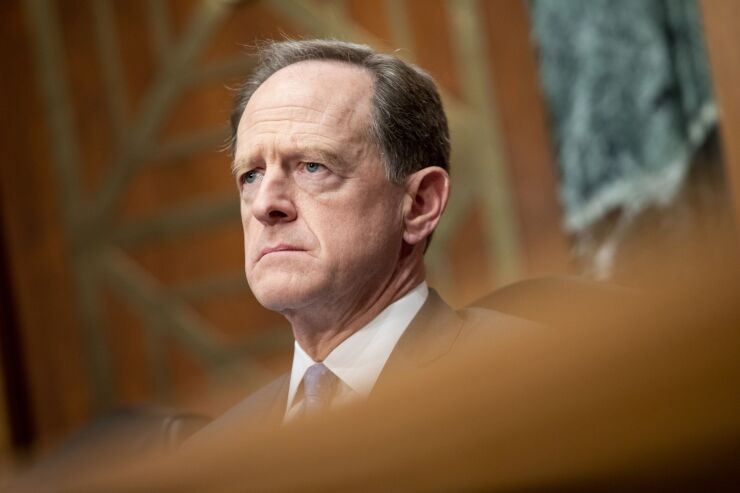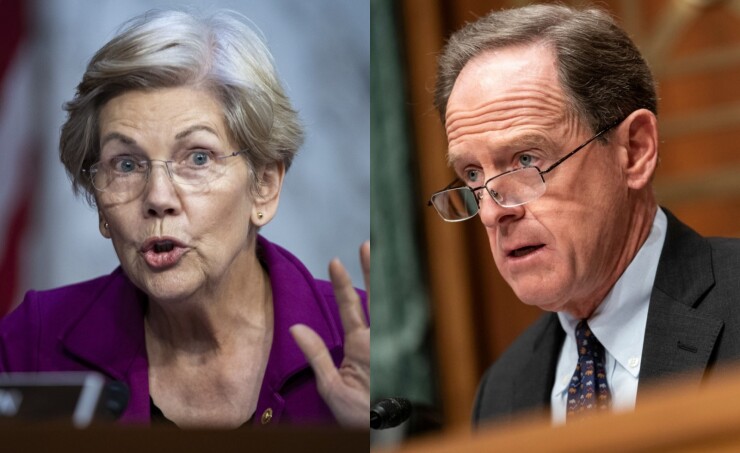When Sen. Pat Toomey leaves office at the end of this year, he wants to take a bit of the Federal Reserve's secrecy with him.
The ranking Republican on the Senate Banking Committee put forth two proposals last week that would force new transparency requirements on Fed regional banks. One is attached to the
If it does, it would be a rare legislative change to Fed policy. It would also give Toomey a signature achievement in the waning weeks of his congressional career, one few expected the Pennsylvania senator to accomplish when he began calling for greater accountability from the central bank last year.

"One of the ongoing themes of my time as the ranking member on the [Senate Banking] Committee has been a push to keep regulators in their lane, to prevent a push back on the idea that regulators ought to be used or ought to pursue an agenda that goes beyond their statutory responsibilities," Toomey told American Banker in an interview this week. "This legislation is one small step in having more transparency, which, over time, will tend to enable Congress to keep the regulators focused on what they're supposed to be focused on, and not doing Congress's job."
Questions around master account transparency arose during the confirmation hearing of Sarah Bloom Raskin, the Biden administration's first pick for Fed vice chair for supervision. Sen. Cythia Lummis, R-Wyo., asked Raskin about how the digital payment and custody firm Reserve Trust obtained a master account from the Federal Reserve Bank of Kansas City.
A former Fed governor and Treasury official, Raskin joined Reserve Trust's board in 2017. The following year, Reserve Trust became the first financial technology firm to obtain a master account.
After the hearing, Toomey and other senators sought records about communication between Raskin and the Kansas City Fed during her time with Reserve Trust, which neither Raskin nor the Fed bank provided. Ultimately, Raskin withdrew from consideration and Reserve Trust's master account was quietly revoked.
Toomey said too many questions from the saga remain unanswered.
"The circumstances are very peculiar," he said. "We couldn't get any answers to the process and methodology, the criteria. All we find out is that an applicant for a master account got denied, then they were approved, then it was withdrawn. And this is a really important public good. There are huge numbers of financial institutions that would love to have master accounts, and the Federal Reserve System owes the public clarity on that process."
The Fed Board of Governors was already considering a policy change similar to Toomey's provision. In early November, it introduced
The Fed declined to comment on Toomey's legislative efforts this week.

Former Federal Reserve Bank of Richmond President Jeff Lacker said more transparency about master accounts is warranted, considering all the government-provided services holders can access and the growing interest in accounts by non-traditional banks.
"I can't see any good reason to keep master account applications and grants secret, especially in light of the significant policy issues involved," Lacker said. "The master account privilege is pretty meaningful in today's regulatory environment, because it provides access to the Fed's clearing and settlement services, which can be highly consequential for a financial services firm."
Even if the scope of change in the NDAA provision is modest, it is still noteworthy given that lawmakers tend to leave the central bank to its own devices.
Aside from the Coronavirus Aid, Relief, and Economic Security Act of 2020, which authorized the Fed to provide emergency credit facilities to businesses impacted by the pandemic, and the 2015
The other piece of legislation put out by Toomey last week saw him pair up with an unlikely ally. The conservative hardliner co-authored the Financial Regulators Transparency Act with progressive standard-bearer Sen. Elizabeth Warren, D-Mass.
The bill has not been formally introduced, but it calls for, among other things, subjecting regional Fed banks to the Freedom of Information Act. Currently, reserve banks only strive to adhere to the "spirit of FOIA," on the grounds that they are not parts of the federal government, but rather independent organizations composed of member banks.
Toomey said he and Warren found common ground after they both had investigations stymied by regional Fed banks earlier this year.
"We don't have a lot of legislation together, we do have profoundly different worldviews, that's true. But as it happened, I observed that she was interested in getting information from the Fed and was being stonewalled. I'm interested in getting information from the Fed, a diffferent category of information, but nevertheless, information, and I was getting stonewalled," Toomey said. "That gave us a commonality of interest and purpose, and that's why we joined forces."
Warren's interest in reserve bank transparency stems from her investigation into the
Warren's office did not respond to requests for comment this week.
Along with his frustrations about master accounts, Toomey has taken issue with the research pursuits of some reserve banks, which he said go beyond the Fed's mandate. His efforts to obtain information about those undertakings and their costs have yielded little to no response.

"Virtually all the regional Fed banks, if not every last one nearly so, really pursued this whole range of research projects that are clearly way outside of their brief of monetary policy and supervision of the banking system to include stuff like climate change and racial justice, as well as K through 12 education," Toomey said. "So, there's no question in my mind the Fed has really wandered off their mandate, and we deserve to understand how and why, and how we're going to get them back to focusing on what they're supposed to focus on."
Toomey said he is unsure what the future holds for the Financial Regulators Transparency Act, but noted that, if nothing else, it sets down a marker and establishes a starting point for the next Congress. Toomey announced in October 2020 that he would not seek a third Senate term.
There are questions about the appetite for the type of change called for in the Toomey-Warren bill, especially with a Democratic majority in the Senate and pro-regulatory White House. Still, Isaac Boltansky, a managing director and head of policy research at the financial services firm BTIG, said the issue will not go away with Toomey.
Thanks to "incredibly shortsighted missteps" by officials, including last year's stock trading scandal and the handling of master accounts, the Fed is facing a "wave of scrutiny that is unlikely to recede anytime soon," Boltansky said. He added that Toomey has laid the groundwork for someone else to continue pushing for reforms after he leaves office.
"No matter your view of Toomey's politics, no one can say he lacks an understanding of the
Issues," Boltansky said. "Toomey is leaving a ball that we should expect another Republican to pick up and run with early in the next Congress. Questions about the Fed extend beyond both Congressional session and political party."
As for Toomey, the 61-year-old said he has no plans for his next act once he leaves Congress. But don't expect him to ride off into the sunset of his final legislative victory.
"I don't have anything lined up. I have no negotiations underway. I have no job offers. I have intentionally chosen to wait till I'm actually out of office. But my plan is to be working," he said. "I feel like I'm way too young to retire, so I'll be looking for opportunities and pursuing what I find. But I have no idea what that looks like at this point."





